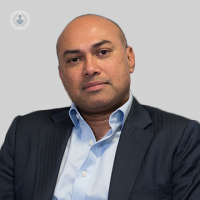Personalised approach to GORD by an expert
Written in association with:While everyone experiences minor symptoms of acid reflux at some point, usually following a spicy meal, reflux can become quite problematic in some people when it occurs frequently and in some people it can completely disrupt their life.
With a number of available treatment options, selecting one that is suitable and appropriate for an individual can be quite a dilemma. Providing some guidance, experienced consultant surgeon Mr Krishna Moorthy goes into the personalised approach to gastro-oesophageal reflux disease (GORD) in this article.

What are the treatment options?
The various treatments that are available for someone with acid reflux are:
- Lifestyle modifications such as weight loss, diet change, and eating patterns
- Medications varying from simple antacids to those that suppress acid production such as proton-pump inhibitors (e.g. Omprazole)
- Endoscopic management options such as radio-frequency ablation (Stretta)
- Surgery (either a fundoplication or the Linx device)
Once symptoms are affecting their quality of life, there are number of questions that an individual will face. Some of these are likely to be:
- When to start treatment such as medications to suppress acid production?
- Whether to continue on medications and at what dose?
- Whether to consider some intervention such as surgery or an endoscopic treatment?
- Which approach—endoscopic treatment or surgery?
- Which surgery—fundoplication or Linx?
This is when discussion with a specialist can really help, not just to navigate the minefield of websites, blogs, and chat forums but also to understand what may be specifically suited to an individual—a personalised approach to GORD.
The factors to take into consideration when making a decision about the various treatment options include symptoms, an individual’s over-all health, risk factors for surgery, response to medications, the dose required to control symptoms, endoscopy findings, barium X-ray findings, and pH and manometry results. The decision is often influenced by a combination of these factors.
How are symptoms taken into account?
Patients who experience typical symptoms such as heartburn respond to medications. Those with heartburn and food/fluid regurgitation describe more satisfaction with surgery. Patients who suffer from abdominal bloating may find that this is actually worsened by a fundoplication and may need to consider alternative options such as endoscopic treatments or a Linx or may need to be counselled about how to manage the bloating if this does occur in the post-operative period.
Endoscopic findings
The presence of oesophagitis and/or additional findings of the complications of GORD, such as scarring (stricture) and Barrett’s oesophagus, are quite confirmatory of GORD and patients with these findings often benefit from prolonged courses of medications or can consider surgery.
Response to medications
Patients who have had even a slight response to medications, or those in whom medications initially controlled their symptoms and then lost that benefit are patients in whom other options such as surgery or an endoscopic procedure may be considered depending on their willingness or fitness to have surgery.
Barium X-rays
This is particularly useful in patients with a large hiatus hernia, often described as a para-oesophageal hernia, to detect signs of blockage from scarring, pressure from the hernia, the extent of reflux, and the length of the oesophagus. The presence of significant reflux may provide the necessary confirmation needed in patients who cannot tolerate a pH study.
pH and manometry study
There are two components to this specialised investigation; the manometry that provides information of the movement or motility of the oesophagus and the pH aspect of the test that provides evidence on the extent of reflux.
The manometry findings are extremely important to making a decision about surgery, especially the type of surgery as people with excessively weak oesophageal motility may not be suitable for a Linx device and a complete (360 degree) fundoplication. The patients will need to be counselled about the risk of persistent swallowing problems after surgery and may need to be considered for a partial (270 degree) fundoplication or an endoscopic approach.
The pH measurements provide confirmatory evidence of reflux and may be essential to making a decision about endoscopic or surgical procedures.
What are the doctor’s final words?
For patients in whom GORD is causing a significant impact on their quality of life, seeing a specialist offers them the advantage of weighing up the various treatment options and selecting one that is personalised to their particular situation.
If you are concerned about your acid reflux or would like more information, you can go to Mr Moorthy’s Top Doctors profile and book a consultation.


